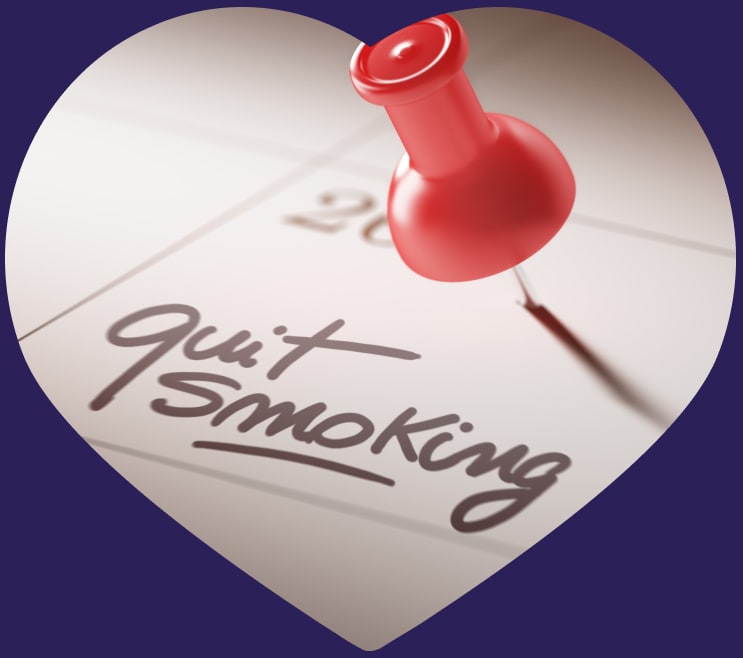
Quit smoking to get big health benefits
Quitting smoking isn’t easy. It might take several tries before you quit for good — but it’s worth the effort. It’s never too late to quit and enjoy the benefits of a smokefree life. You can do it!
How does quitting smoking protect my health?
Quitting starts to heal your heart right away
No matter how long you’ve been smoking, once you stop, your heart health starts improving right away. Minutes after having your last cigarette, your heart rate and blood pressure go down. Within 1 to 2 years, your risk for heart attack drops sharply. And within 3 to 6 years after quitting, your risk for heart disease drops to half that of someone who still smokes.
You can lower your risk for many health problems
Quitting smoking doesn’t just protect your heart — it also has huge benefits for your overall health. For example, quitting lowers your risk of 12 different types of cancer and helps your lungs work better. Plus, quitting smoking can add as many as 10 years to your life!
How can I get started?
Pick your quit date
Pick a date in the next 2 weeks and mark it on your calendar. Try to choose a less busy day in your schedule and use the time before your quit date to prepare. You can plan to quit all at once or slowly reduce how much you smoke until you stop completely on your quit date.
Consider using a quit-smoking medicine
Medicines to help you quit smoking can double your chances of quitting successfully, and there are lots of different options to try. Nicotine replacement therapy (NRT) medicine comes as gum, lozenges, or patches you can buy over the counter. You can also talk with your doctor about prescription medicines to help you quit.
Get rid of triggers
On your quit date, get rid of all your cigarettes and everything else that reminds you of smoking. Remove ashtrays, lighters, and matches from your home and car. Try putting NRT gum or lozenges in your glove compartment, coat pockets, and any other places you used to keep cigarettes or lighters.
Make it official
Tell friends and family when you plan to quit so they can support you. If you use social media, consider sharing that you’re quitting smoking on your profile to hold yourself accountable.
Reach out for support
You don’t have to go on this journey alone! There are special counselors who are trained to support people who want to quit smoking. They can help you make a quit plan, stay on track, and cope with triggers and slip-ups along the way. You can also talk with your doctor or a mental health professional to get support.
These free resources can help you quit:
- Call 1-800-QUIT-NOW (1-800-784-8669) to get expert phone counseling support.
- Check out the LiveHelp chat service to talk online with a trained counselor.
- Text QUITNOW (English) or DÉJELO YA (Spanish) to 333888 for text message support to help you stay motivated.
- Use the quitSTART smartphone app to track your progress and get helpful tips.
- Join a smokefree social media community to share your experiences and connect with other people who are trying to quit.
What other tips can I use to help me quit?
Manage withdrawal symptoms
Many people have withdrawal symptoms when they quit smoking — like feeling irritated or anxious, being hungrier than usual, or having trouble sleeping. These symptoms usually get better within a few weeks after quitting. Try these steps to feel better:
- Get active. Physical activity can help you sleep and boost your mood. If you’re feeling jittery, try taking a walk around the block or doing a few jumping jacks.
- Eat healthy. If you’re feeling hungrier than usual, choose healthy snacks like fresh fruits and veggies or unsalted nuts. Eating healthy foods can help you feel more satisfied.
- Stress less. Find healthy ways to deal with stress, anxiety, and irritation. Deep breathing exercises can help you feel calmer.
If you have anxiety or depression that doesn’t get better after a couple of weeks, ask your doctor for help.
Cope with cravings
Cravings can be tough, but they fade over time. Use these tips to help you cope:
- Distract yourself. When you feel a craving coming on, start doing something else. Switch tasks at work or try a hands-on chore, like gardening or folding laundry.
- Get support. Save the quitline number or online chat link to your phone. You can also call a friend when you think you’re about to have a cigarette.
- Get moving. When cravings hit, get up and move. You can walk, jog, or dance around the house — just keep moving until the craving passes.
- Breathe through it. Take slow, deep breaths until you feel more in control.
- Go somewhere you can't smoke. Try a public place, like a store or restaurant, where you don’t have the option to smoke.
Don’t let a slip-up get you down
If you slip and have a cigarette, that doesn’t mean you failed. Just get right back to not smoking and aim to quit for good. It’s very common to need several tries! The key is to learn from each attempt and try again. And remember that you don’t have to go it alone — reach out to a quit-smoking coach, friends, or family for support.